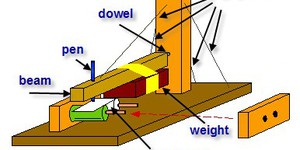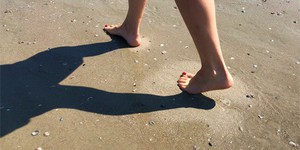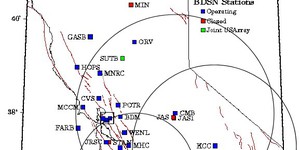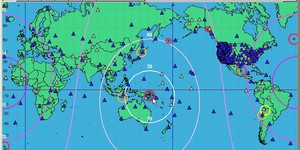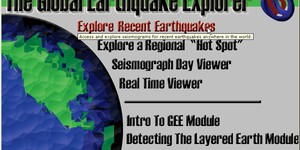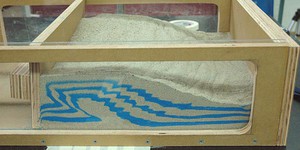High School, Experiment in Geology Science Projects (23 results)
Study what gradually shapes and changes the landscape and ocean floor. Discover how to map and track sudden forces like earthquakes and volcanoes. Break down rocks or explore soil.
|
The papier-mâché volcano is a real classic, but there are many other ways to make an even more exciting and interesting science project focused on volcanoes!
To get started on your own volcano-based science project, you will want to first have an understanding of how volcanoes form. This is related to tectonic plates. The entire outer shell of the Earth, known as the lithosphere, is made up of tectonic plates that are constantly moving. There are seven or eight large tectonic…
Read more
Featured
Have you heard that garlic powder is supposed to inhibit the growth of bacteria? Which do you think would make a better disinfectant: a solution of garlic powder or a solution of bleach? This project shows you a straightforward way to compare the effectiveness of different disinfectants (or other antimicrobial agents), by measuring zones of inhibition on a culture plate.
Read more
If you live in an area where earthquakes happen, you might be especially interested in this science project. You will learn how to build your own seismograph and how to use it to detect ground motion.
Read more
New
Drones are small, fast, and maneuverable - this can make them very hard to knock down! Check out this Mark Rober video where he explores both how professional defense companies and some backyard YouTube engineers tackle the problem of knocking drones out of the sky. Can you take this engineering challenge on yourself? What methods can you devise to take down a drone? Which one works the best?
Drones can be expensive, and you probably do not want to risk damaging a $1,000 drone for your science…
Read more
Did you ever notice the cool patterns around your footprints when you take a walk in the wet sand at the beach? The pressure of your feet has effects far outside your footprints. Here's a project that uses a simple experimental apparatus to investigate how the volume of wet sand changes under pressure.
Read more
When an earthquake happens, how are scientists able to determine the original location of the quake? In this project, you'll use archived data from a network of seismometers to find out for yourself. You'll create your own seismograms from the comfort of your own computer with an easy-to-use webpage interface. Then you'll analyze your seismograms to determine the distance of the quake from each seismometer station. By mapping your analyzed data, you will be able to determine the location of the…
Read more
When an earthquake happens, how are scientists able to determine the original location of the quake? In this project, you'll use archived data from a global network of seismometers to find out for yourself. You will make your own seismograms using the Global Earthquake Explorer program, and then use the seismograms to determine the location of earthquake epicenters.
Read more
New
Have you ever noticed that on a hot day, it's more comfortable to wear a light-colored shirt than a dark one? Or that it's cooler in a park than walking down a street? This happens because different surfaces absorb and reflect heat in different ways. Urban heat islands are parts of cities where man-made surfaces like pavement and buildings replace natural surfaces like grass and trees. In this project, you will use temperature and satellite data to see if certain areas in a city have higher…
Read more
When an earthquake occurs, seismic shock waves travel out through the earth from the source of the event. The shock waves travel through the earth or along the Earth's surface, and can be recorded at remote monitoring stations. Some of the waves that travel through the earth are blocked or refracted by the Earth's liquid core, which means that monitoring stations located certain distances from the earthquake do not detect these waves. This creates a "seismic shadow" that you can use to…
Read more
Is soil structure an important factor in earthquake dynamics? Investigate soil liquefaction and how different soil types respond to earthquake movements. Are movements more dramatic in sandy/loamy or clay type soils? Which soil structures are most stable? Which are the most volatile? (MCEER, 2005)
Read more
Here's a project that involves a different kind of sandbox than the ones you usually think of. This one has a moving wall inside, acting like a piston, to compress the sand. You can make layers using two different colors of sand, and then see what happens when you compress the layers with the piston. If you're handy with woodworking tools, this is a good project to give you a feel for the effects of geological forces that deform the Earth's crust.
Read more
Did you know that waves travel through the Earth's crust all the time? One major source of these waves is earthquakes, although ground motion can also be caused by something man-made, such as a mine blast or nuclear explosion, or other natural events, such as landslides or volcanic activity.
How does an earthquake cause these waves? The entire outer shell of the Earth, known as the lithosphere, is made up of tectonic plates that are constantly moving. There are seven or eight large…
Read more
The same principles of geology that we use to investigate the Earth can also be applied to other planets. Visit the Astrogeology Research Program at the USGS to find out how information about the geology of other planets can be gathered (USGS, 2006). Can you make a map or model of another planet? What minerals are found on other planets? Which planets have similar composition to the earth? What kind of geological forces occur on other planets? Do other planets have earthquakes, landslides…
Read more
|
Explore Our Science Videos
How to Build a Paper Speaker
Make an LED Night-Light
Popsicle Stick Catapult




